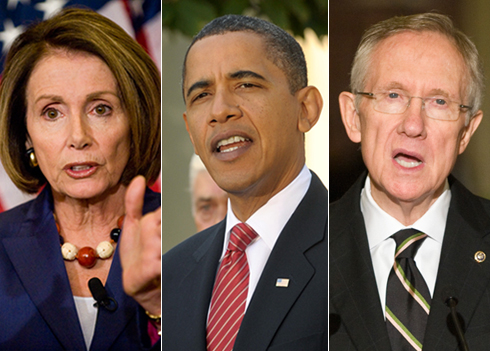It’s not over, but an agreement on one of the stickiest of the sticking points on health care clears a path for a final health care bill to pass Congress and reach President Obama’s desk.
After the deal with Congressional leadership and labor unions was reached on how to handle the excise tax that funds a large portion of the health care bill, administration and union officials tonight offered a broad outline for how it would work.
Declining to set a timeline, the officials said the agreement sweeps what was a “potentially troublesome” difference between the House and Senate bills to the side and brings the team far nearer to a conclusion.
House and Senate members, whose support will be crucial, have been briefed. Though unions, who opposed the excise tax as harmful to workers, gained some real, if modest, concessions, they are now hailing a bill which, by their own admission, isn’t guaranteed to insulate the middle class from tax hikes.
“The compromises we reached in last 24 hours will really make a difference in making sure working people who have health care can hold onto their health care,” said Anna Burger, President of the labor federation Change to Win.
Pfeiffer called them “very intense and long discussions” that improved the bill.
“There’s always a natural assumption as you get down to the wire here these bills tend to get worse not better,” Pfeiffer said, but “actually [we have] been able to make this a better provision in terms of policy.”
Under the new plan, dental and vision plans would be exempted, and the government would offer “transition relief” to employers as they adjust to the permanent provision.
While labor leaders say they’ve been told the House and Senate are on board, the White House says that is up to Speaker Nancy Pelosi and House Majority Leader Harry Reid.
Administration officials told reporters they did not have an estimate for the cost, though labor leaders said it would be about $60 billion.
“We are much closer to 100 percent now than we were this morning,” an official said. “But we don’t take anything for granted until we have a bill that’s on the president’s desk to sign.”
AFL-CIO President Richard Trumka said the team is on the “threshold of a real milestone,” and Gerald McEntee, President of AFSCME, said he believes the Congress is good to go on the deal as well.
“I had the opportunity today to speak with the House Democratic caucus. I was there about two and a half hours, and they were quire receptive, although there were some people who wanted to continue to fight for no excise at all but I did tell them the American labor movement at this juncture,” is on board with the compromise, he said.
Asked whether the House and Senate are on board, McEntee told reporters, “We are informed that they are. We have spoken with them. We think that everyone is on board with this.”
But there’s just one catch! According to Trumka, nobody’s really sure if the compromise really addresses their objections.
“We don’t actually know what’s the effect,” he said.
We hope the bill will do what its supposed to do — and cost containment measures will start to ratchet down health care [costs]. Hopefully no Americans will bump up against the excise tax. If that doesn’t work, you could see the excise tax kick in and people face higher premiums. [Hopefully] the bill works and that doesn’t happen.
A primer on the compromise is below.
o Raising the threshold at which family plans are taxed from $23,000 to $24,000 in 2013 for all working families, with annual increases of Consumer Price Index plus one. The threshold for single plans will be $8,900. (Taft Hartley plans will be considered at the family rate.)
o Raising the threshold on plans further if health care costs grow faster than expected from 2010-2013
o Exempting dental and vision costs beginning in 2015 (which could raise the threshold as much as $2000)
o Raising the threshold for plans that have significant numbers of women and/or older workers.
o Preserving the original Senate proposal to raise the threshold for plans with workers in high risk professions, affecting more than 9 million workers.
o Preserving the original Senate proposal that would raise the threshold for plans with retirees age 55 and up.
o Providing transitional relief for employers and workers to adjust to tax:
o Temporarily raising the threshold for high cost states, affecting more than 38 million workers.
o Providing a five year transition window for state and local employee plans and plans negotiated through collective bargaining agreements before they are subject to the tax, as typically done when federal laws affecting workers are enacted so that agreements will not have to be renegotiated.
o The ability for bargaining plans to go into the exchange in 2017.
Additional reporting by Christina Bellantoni and Rachel Slajda










